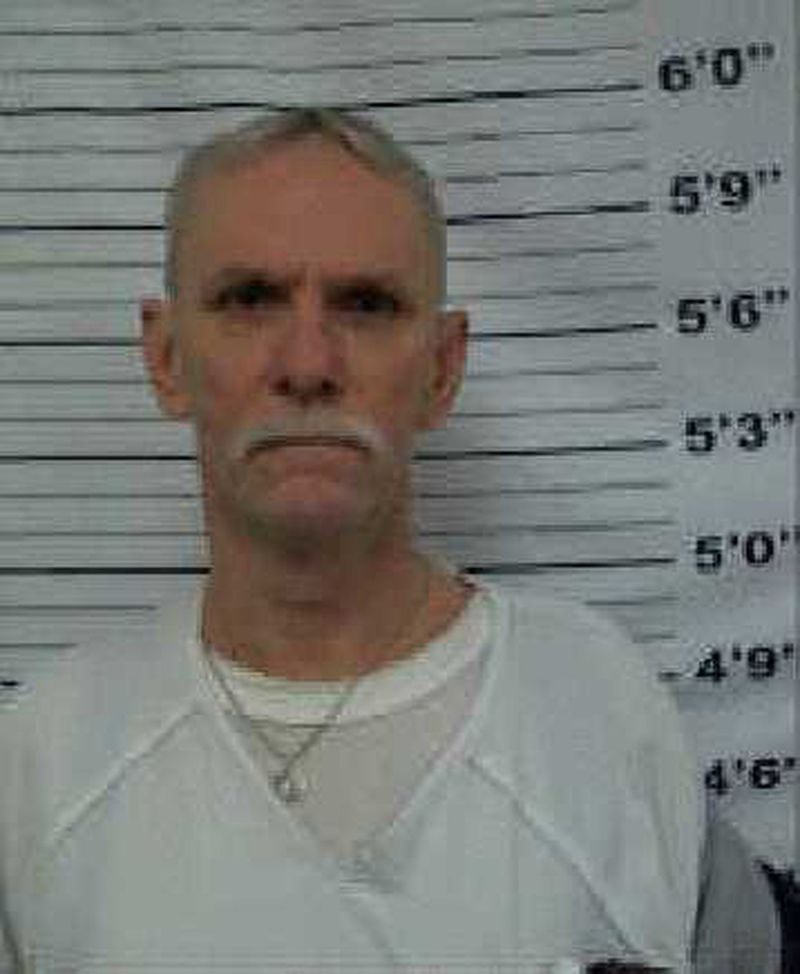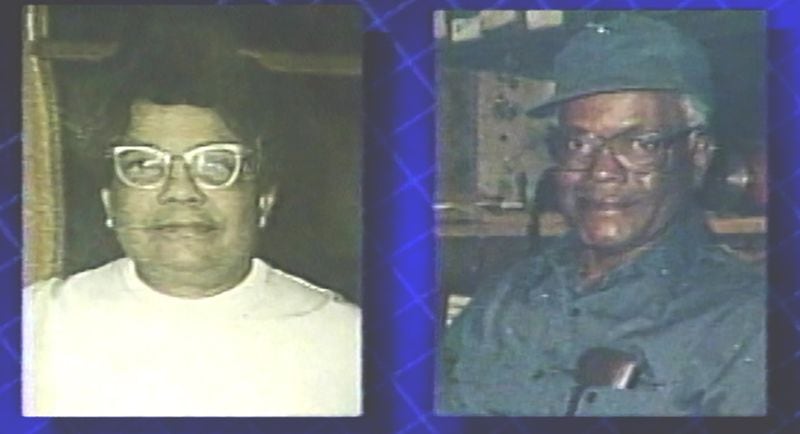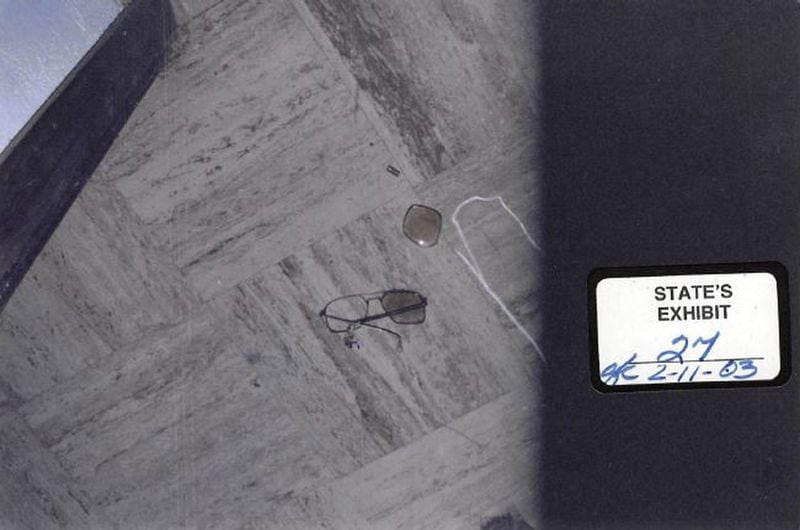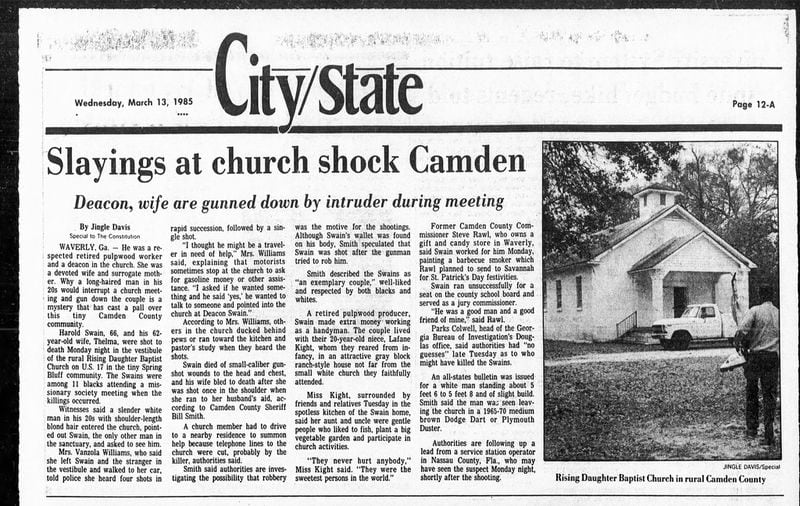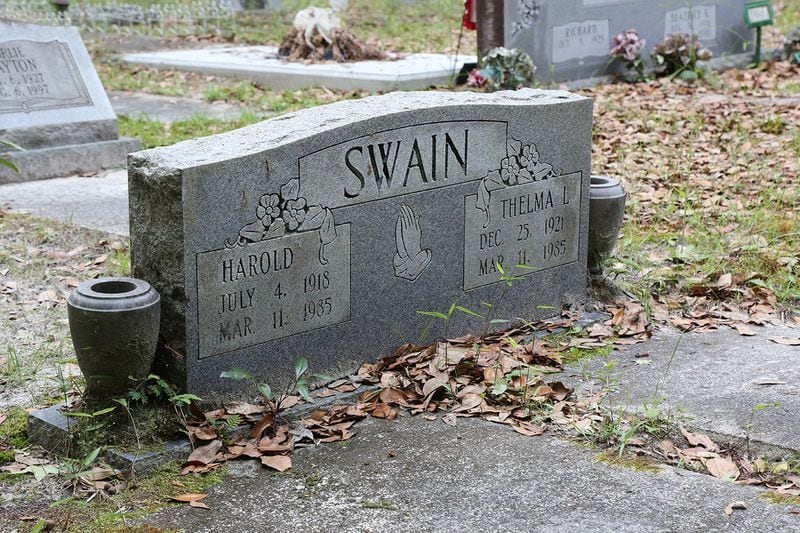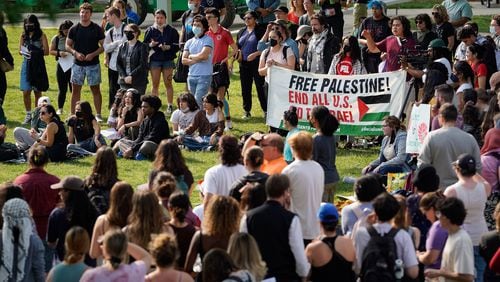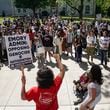One night in 1985, a white man walked into an African American church in southeast Georgia and fatally shot a beloved couple. For decades, DNA found at the crime scene didn’t match that of any of the suspects who were tested — until now.
Erik Sparre, a suspect whom police dropped from their investigation in 1986 based on his alibi, is a match, according to a new court filing by the Georgia Innocence Project and the King & Spalding law firm. The lawyers, working for the man convicted of the murders, decided to do the test after learning that reporting by The Atlanta Journal-Constitution uncovered problems with Sparre’s alibi.
The test compared DNA taken from Sparre’s mother to DNA in hairs stuck in the hinge of a pair of glasses found near the bodies. The results show that the hairs in the glasses belonged to someone from Sparre’s maternal line, the Tuesday court filing says. “The new DNA evidence is critically significant because it for the first time provides reliable forensic physical evidence linking a known suspect, Erik Sparre, to physical evidence at the crime scene, the glasses,” the lawyers wrote.
Dennis Perry, the man imprisoned nearly 20 years for the crime, has never been linked to the crime by physical evidence and has maintained his innocence. A DNA test before his trial showed he did not match.
The DNA match with Sparre comes after decades of investigation by police, prosecutors, lawyers and journalists. The case has been the subject of a podcast and an episode of TV’s “Unsolved Mysteries.” It has sown grief and division in Camden County and among law enforcement officers. At least three detectives who worked the case have long believed that Perry is innocent.
» SPECIAL PRESENTATION: "The Imperfect Alibi"
» FULL COVERAGE: The Rising Daughter investigation
Sparre was considered a suspect early on because he told an ex-wife that he committed the crime, according to records in the 6,000-page case file. Her family played for police a recording in which a man they said was Sparre said he murdered the couple. It isn’t clear what happened to the tape. It isn’t stored with the case file. Much of the evidence in the case has gone missing.
Reached by phone by the AJC on Tuesday, Sparre, 56, said he wanted to be left alone. Told of the DNA match on the glasses, he said he wasn’t missing any glasses. He told the reporter to stop calling and hung up. In previous interviews with the AJC, he has said he is innocent. “I don’t even know where the church is,” he said. “I have no reason to know.”
The new court filing points out that Sparre has been described to police as racist; Sparre denies he’s racist.
Brunswick Judicial Circuit District Attorney Jackie Johnson’s office has been notified of the DNA results, according to the latest court filing, which asks for a new trial for Perry. The DA’s office had no immediate comment on Tuesday. The Camden County Sheriff’s Office didn’t respond to a message. Chief Assistant District Attorney John B. Johnson III, who prosecuted Perry, couldn’t be reached.
A spokeswoman for the GBI said the agency is aware of the DNA match. “At this time, we are evaluating what further actions will be taken,” said Nelly Miles.
Perry’s motion for new trial, which is before Glynn County Superior Court, argues that Perry likely would’ve never been tried if the DNA results were available before. The filing posits that Sparre likely would’ve been investigated because the DNA test shows a connection between him and the only DNA in the case.
Perry, 58, hopes to finally be set free.
“Before, I had hope. But now, with this DNA out there, I almost feel like a free man already,” Perry said in a statement. “I’ve just got to wait for the courts to do the right thing.”
A shocking crime, a suspect’s alibi
Harold and Thelma Swain were killed on the evening of March 11, 1985, by a stranger who appeared in the entryway of Rising Daughter Baptist Church. The church sits on Highway 17 in the rural Spring Bluff community.
The couple were attending a Bible study with 10 other people. None who saw the visitor knew who he was.
The man said he wanted to speak to “him” and pointed at Harold Swain, 66, a retired pulpwooder who served as a deacon. The two men started to struggle, and Thelma Swain, 63, a homemaker, went to help her husband. Moments later the Swains, among the most respected residents in the community, fell to the floor, shot to death, as the killer fled.
Investigators had numerous leads because of widespread media attention on the case, but they couldn’t find enough evidence to identify the killer. They weren’t sure of the motive. They thought it could’ve been a robbery attempt gone wrong.
Erik Sparre came onto investigators’ radar a year after the murders.
According to a police report, his ex-wife’s family let an investigator hear a tape of a man they said was Sparre, who had been calling with threats: “I’m the motherf----- that killed the two n------ in that church,” the man said.
Speaking with the AJC in February, Sparre, who lives in rural Brantley County with his elderly mother, said he never told anyone he killed the Swains. Told that police records say he was on tape saying it, Sparre still denied it. Days later, in another telephone interview, he suggested he lied about killing the couple: “I was a stupid young kid, tried to scare my wife.”
The ex-wife also told police that Sparre “hated blacks” and had a pair of beat-up glasses. An investigator showed her three pairs and asked if any looked like Sparre’s. She picked the pair from the crime scene. Before that moment, police had kept information about the glasses close to the vest.
A GBI agent called a number he’d obtained for a Brunswick Winn-Dixie, where Sparre was believed to be working the night of the murders, to check out his alibi. A man who said he was Sparre’s boss told the agent he would dig up Sparre’s timecards and call back. The boss, listed in the detectives’ file as Donald A. Mobley, called back a few weeks later and said Sparre had worked his job as a stocker overnight, from the afternoon before the murders to the morning after.
DNA testing wouldn’t become widely used until years later, so the hairs from the glasses wouldn’t be tested for DNA until after Perry’s 2000 arrest.
With Sparre’s alibi in hand in 1986, the investigators immediately moved on to other possible suspects.
The conviction
The case slowly fell cold.
Perry became the focus of the investigation in 1998, more than a decade after the murders. By that point, the two initial investigators on the case had retired from police work, and all leads had run dry. The Sheriff’s Office hired a new investigator, a former deputy named Dale Bundy. His only assignment was to work the Swains’ murders.
As Bundy began re-interviewing witnesses, one led him to a woman whose daughter had dated Perry. The mother, Jane Beaver, told Bundy that Perry was the killer.
Beaver said Perry had told her he was going to kill Harold Swain because Swain had laughed in his face when Perry asked for money, according to Bundy’s files.
Beaver testified at Perry’s trial in 2003. Afterward, some jurors cited her testimony as playing a critical role in their decision. The jury didn’t know that Beaver would get $12,000 in reward money for her testimony, a disclosure that only came later.
The DA’s case file shows Beaver asked for reward money on the day after Perry’s arrest. Officials never acknowledged she was paid. But in 2018, when the Georgia Innocence Project was working with lawyers from the “Undisclosed” podcast to examine Perry’s case, one of the co-hosts discovered a document that proved Beaver received the money.
That revelation is part of a 2019 pending petition for Perry’s release.
"Before, I had hope. But now, with this DNA out there, I almost feel like a free man already. ... I've just got to wait for the courts to do the right thing." —Dennis Perry, imprisoned nearly 20 years for the crime
The petition is before the superior court in Coffee County, where Perry is held in prison. The filing contains a number of other new discoveries in the case, but none is related to Sparre. The DNA match didn’t come until months after the 2019 petition was filed.
Because investigators had moved away from Sparre based on his alibi, his name never came up in Perry’s trial. So the jury didn’t hear about Sparre’s alleged confessions to his ex-wife and to another person who came forward in 1998 to tell Bundy that Sparre had suggested 10 years earlier that he committed the murders.
The glasses found at the church weren’t part of the case against Perry. Perry’s DNA did not match that of the hairs found in the hinge, and the state argued that the glasses, found next to the bodies in the middle of the floor, weren’t relevant.
The two initial lead investigators on the case believe this was just one of the state’s mistakes. Former Chief Sheriff’s Deputy Butch Kennedy and former GBI agent Joe Gregory both have long believed that Perry is innocent. They testified at trial that they had cleared Perry in 1988 by speaking with Perry’s boss and showing a photo lineup to the church witness who’d spoken to the killer.
Perry worked into the late afternoon on the day of the murders in Jonesboro, Gregory said. Gregory, who agreed to be a witness for the defense, testified that it was virtually impossible for Perry to make it to the scene, easily more than four hours away, in time to kill the couple.
Alibi issues
The AJC began looking into the case after learning of the findings by “Undisclosed.” The podcast, and the Georgia Innocence Project’s petition on Perry’s behalf, mentioned a former drug trafficker as an alternate suspect. Neither deeply examined Sparre or his alibi.
Through searches of public records and interviews, the AJC discovered that none of the identifying details listed in police files about Mobley, the man who vouched for Sparre, matched any person by that name. Those include date of birth, Social Security number, address and home and work numbers. The AJC located the man who managed the store at that time. His name is David Mobley. Apart from the last name, none of his personal details match those in the report. He told the newspaper he had no memory of police calling about the murders or Sparre, and that he never had an employee named Donald Mobley.
Gregory, the now-retired GBI agent who spoke with the person who identified himself as Mobley, said recently he now fears he may have been given a fake number by Sparre, and the person claiming to be the boss might’ve been lying.
Gregory said Tuesday he was excited by the DNA news and what it might mean for Perry. “I am tickled to death. I’m hoping this gets him out,” Gregory said. Still, the thought that he might’ve been tricked all those years ago didn’t feel good.
The motion for new trial calls Sparre’s alibi “highly suspect and likely false.” The motion uses the alibi issues, Sparre’s alleged statements about killing the Swains and the DNA to paint a picture of him as a suspect who should’ve been given more scrutiny by law enforcement. But the lawyers come back to the DNA repeatedly, driving home its importance.
“The laboratory determined that it can exclude, with 99% confidence, 99.60% of the population of North America as being a contributor of the hairs…,” the lawyers wrote. “In other words, Mr. Sparre falls within the 0.4% of the general population that cannot be excluded as a contributor of the DNA on the glasses that were found inches from the victims at the crime scene and are believed to belong to the Swains’ killer.”
In February, when the Georgia Innocence Project investigator went to Sparre’s home, he was not there. His mother provided a few of her hairs.
Sparre sounded rattled when he phoned the AJC shortly after his mom told him about the hair samples. But he said he wasn’t afraid.
“This DNA,” Sparre said, “will prove that I didn’t do it.”
About the Author

